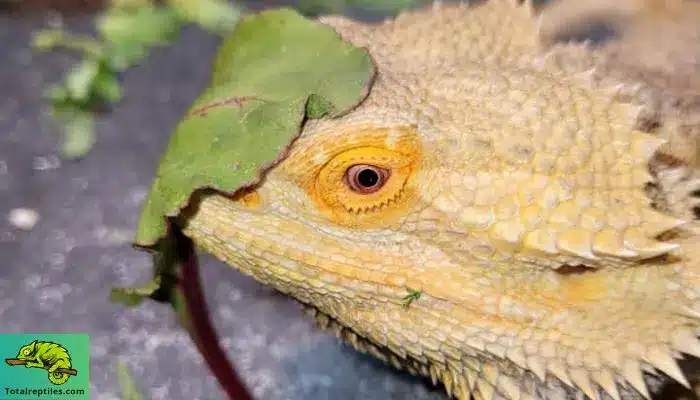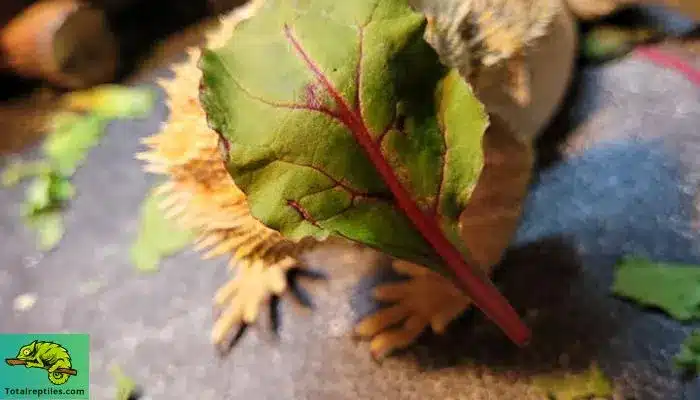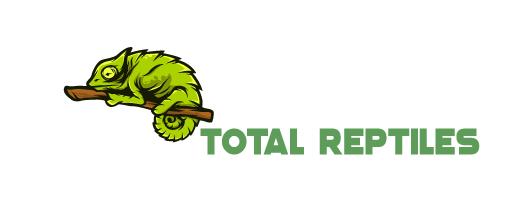Bearded dragons can enjoy Swiss chard in their diet, but moderation is key due to its high oxalate content. Swiss chard is a very nutritious green for bearded dragons to eat. It provides calcium, which is needed to grow their bones properly. However, it does tend to be high in oxalates, so care must be taken when feeding it beardie.
Chard is a nutritional powerhouse that tantalizes taste buds and health-conscious minds. Its colorful stems and large, tender leaves make it a versatile addition to culinary creations. Magnesium, potassium, and vitamins A, K, and C increase this vegetable’s immunity, digestion, and bone health.
In this blog article, I’ll present a detailed, research-based response based on my years of beardie care.

Swiss Chard: The Vibrant Leafy Green Delight
Swiss chard is a leafy green vegetable in the same family as beets and spinach. Other common names include leaf beet, silverbeet, spinach beet, crab beet, and seakale beet. It goes by the scientific name Beta vulgaris subsp. cicla.
This green has large, wide, fan-like green leaves with thick stems that come in white, yellow, red, and purple colors. The leaves and stems can be cooked and eaten together or separately.
Nutritional Values of Swiss Chard for Bearded Dragons
This table presents the nutritional values of Swiss chard based on data from the USDA Food Data Central. Understanding these values can help reptile enthusiasts provide their bearded dragons with a balanced and nutritious diet.
| Nutrient | Value per 100g |
| water | 92.7 g |
| Energy | 19 kcal |
| Protein | 1.8 g |
| Carbohydrates | 3.74 g |
| Dietary Fiber | 1.6 g |
| Sugars | 1.1 g |
| Fat | 0.2 g |
| Calcium | 51 mg |
| Phosphorus | 46 mg |
| Potassium | 379 mg |
| Vitamin A | 6116 IU |
| Vitamin C | 30 mg |
| Vitamin E | 1.89 mg |
| Vitamin K | 830 µg |
| Folate | 14 µg |
| Beta-Carotene | 3652 µg |
NOTE: Swiss chard can be a healthy addition if a bearded dragon eats a diversified and balanced diet with insect sources and other leafy greens. Always consult a veterinarian specializing in reptile care to tailor the diet.
Is Swiss Chard Safe for Bearded Dragons to Eat?
Yes, Swiss chard is safe and healthy for bearded dragons to eat in moderation as part of a balanced diet. This verdant leafy vegetable brings many advantages to the bearded dragon’s diet. Some benefits are mentioned below:

- Excellent source of vitamin A – Swiss chard contains impressive amounts of beta-carotene, a precursor to vitamin A. Vitamin A helps with proper vision, bone growth, reproduction, and immune system function.
- High in vitamin K – Bearded dragons need vitamin K for proper blood clotting. This leafy greens is an excellent plant-based source of this nutrient.
- Good source of calcium – These leaves provide a decent amount of calcium essential for bearded dragons.
- Vitamin C – Vitamin C helps produce collagen and boosts immunity.
- High in fiber – The fiber in Swiss chard supports healthy digestion and prevents constipation, a common problem for dragons.
- Packed with antioxidants – Swiss chard contains antioxidants like alpha lipoic acid and carotenoids such as lutein and zeaxanthin that fight disease and inflammation
The Risks of Feeding Swiss Chard to Your Bearded Dragon
There are several important considerations when feeding Swiss chard to bearded dragons.
Oxalates and Calcium Bind
Swiss chard, like many other leafy greens, contains compounds called oxalates. Bearded dragons require an appropriate calcium-to-phosphorus ratio for optimal bone health. This deficiency is known as metabolic bone disease.
High Fiber and Digestive Issues
While fiber is essential for human digestive health, bearded dragons have a different digestive system. They are primarily insectivores, meaning their digestive tract is adapted to process animal-based protein. Feeding them excessive amounts of high-fiber vegetables like this vegetable can lead to digestive issues.
Variety and Balanced Nutrition
Variety is the cornerstone of a balanced bearded dragon diet. An exclusive diet of Swiss chard may provide vitamins A and K, but it could lack the essential vitamin D3, which aids calcium absorption.
NOTE: To ensure your bearded dragon’s health and happiness, consult a veterinarian specializing in reptile care.
Preparing Swiss Chard for Bearded Dragon Consumption
As responsible reptile owners, ensuring the chard is prepared correctly to provide optimal nutrition while minimizing potential risks is crucial. For the bearded dragon’s health and happiness, we’ll address this green’s portion size, feeding frequency, and cleanliness.
Selecting the Right Portion Size:
Choosing the right portion size for a bearded dragon is essential to maintaining a balanced diet. The portion size should be about the dragon’s head or somewhat greater.
Feeding Frequency and Variety:
Aim to offer Swiss chard and other greens around 3 to 4 times weekly. Provide high-quality insects like crickets, dubia roaches, or mealworms to fulfill their protein requirements on alternate days.
Cleaning Procedures:
Before feeding Swiss chard, follow these steps to ensure it’s safe for consumption:
- Wash Thoroughly: Wash chard leaves under running water to remove dirt, pesticides, or contaminants.
- Inspect for Blemishes: Examine the leaves for any signs of wilting, mold, or discoloration. Discard any leaves that appear damaged or spoiled.
- Organic Sources: Whenever possible, opt for organic Swiss chard to minimize the risk of pesticide exposure.
- Remove Tough Stems: Bearded dragons may struggle to digest tough stems. Trim these off before feeding, focusing on the tender, leafy parts.
- Pat Dry: After washing, pat the leaves dry with a paper towel. Excess moisture can lead to bacterial growth, so ensure the leaves are adequately dried.
Remember that moderation and variety are key. Selecting the appropriate portion size and feeding frequency and following proper cleaning procedures will offer your pet companion a nutritionally balanced diet.
Can bearded dragons eat chard?
Yes, Bearded Dragons can safely eat chard as part of a balanced diet. This chard contains vitamins A, C, and K, calcium, and iron. although moderation is vital. Too much chard can lead to digestive issues due to its high oxalate content, which may hinder calcium absorption.

To serve chard to your reptile friend, chop it into manageable pieces and remove tough stems. Opt for a variety of veggies to ensure a diverse diet.
Can bearded dragons eat rainbow chard?
Bearded Dragons can safely eat Rainbow Chard. This colorful leafy green contains calcium and vitamin A, which your dragon needs to stay healthy. Rainbow Chard should be offered as part of a varied diet alongside other leafy greens and appropriate insects.
FAQ
Can bearded dragons eat red chard?
Yes, bearded dragons can indeed eat red chard. Red chard is a nutritious leafy green that can be included in a bearded dragon’s diet.
Can bearded dragons eat green chard?
Green chard can be included in a bearded dragon’s diet in moderation. This lush green vegetable contains nutrients that help improve pet’s health. As with any new food item, it’s essential to introduce it gradually and observe the bearded dragon’s response.
Conclusion
Swiss chard is a very healthy, leafy green vegetable that provides substantial nutrition for bearded dragons. It is safe for dragons to eat when fed properly in moderation as part of a balanced diet.
The high levels of vitamin A, K, calcium, and antioxidants make it a beneficial addition to a dragon’s vegetable intake 2-3 times per week. Follow the tips above for preparing and feeding Swiss chard safely. Monitor your dragon for any digestion issues.

